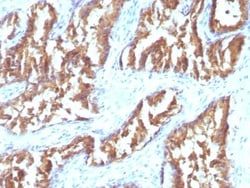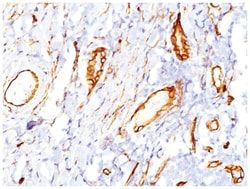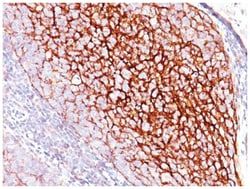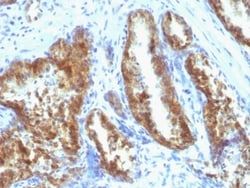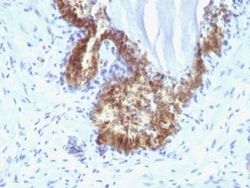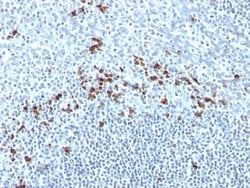Isocitrate Dehydrogenase 1/IDH1 Antibody (IDH1/1152), Novus Biologicals™
Mouse Monoclonal Antibody
Manufacturer: Fischer Scientific
The price for this product is unavailable. Please request a quote
Antigen
Isocitrate Dehydrogenase 1/IDH1
Concentration
0.2mg/mL
Applications
Western Blot, Flow Cytometry, Immunohistochemistry (Paraffin), Immunofluorescence
Conjugate
Unconjugated
Host Species
Mouse
Research Discipline
Stem Cell Markers
Formulation
1.0mM PBS and 0.05% BSA with 0.05% Sodium Azide
Gene Alias
Cytosolic NADP-isocitrate dehydrogenase, EC 1.1.1.42, IDCD, IDH, IDP, IDPC, isocitrate dehydrogenase [NADP] cytoplasmic, isocitrate dehydrogenase 1 (NADP+), soluble, NADP(+)-specific ICDH, NADP-dependent isocitrate dehydrogenase, cytosolic, NADP-dependent isocitrate dehydrogenase, peroxisomal, Oxalosuccinate decarboxylase, PICD
Gene Symbols
IDH1
Isotype
IgG1 κ
Purification Method
Protein A or G purified
Test Specificity
It recognizes a 45kDa protein, which is identified as isocitrate dehydrogenase (IDH1). It belongs to the isocitrate and isopropylmalate dehydrogenases family. IDH1 catalyzes the third step of the citric acid cycle, which involves the oxidative decarboxylation of isocitrate, forming ketoglutarate and CO2 in a two-step reaction. The first step involves the oxidation of isocitrate to the intermediate oxalosuccinate, while the second step involves the production of ketoglutarate. During this process, either NADH or NADPH is produced along with CO2. Recently, an inactivating mutation of IDH1 has been implicated in glioblastoma. IDH1 appears to function as a tumor suppressor that, when mutationally inactivated, contributes to tumorigenesis in part through induction of the HIF-1 pathway.
Clone
IDH1/1152
Dilution
Western Blot 0.5 - 1.0 ug/ml, Flow Cytometry 0.5 - 1 ug/million cells in 0.1 ml, Immunohistochemistry-Paraffin 0.5 - 1.0 ug/ml, Immunofluorescence 0.5 - 1.0 ug/ml
Classification
Monoclonal
Form
Purified
Regulatory Status
RUO
Target Species
Human
Gene Accession No.
O75874
Gene ID (Entrez)
3417
Immunogen
Recombinant fragment (119 Amino acid residues around aa 280-420) of human IDH1 protein
Primary or Secondary
Primary
Content And Storage
Store at 4C.
Molecular Weight of Antigen
46 kDa
Description
- Ensure accurate, reproducible results in Western Blot, Flow Cytometry, Immunohistochemistry (Paraffin), Immunofluorescence Isocitrate Dehydrogenase 1/IDH1 Monoclonal specifically detects Isocitrate Dehydrogenase 1/IDH1 in Human samples
- It is validated for Immunohistochemistry, Immunohistochemistry-Paraffin.

